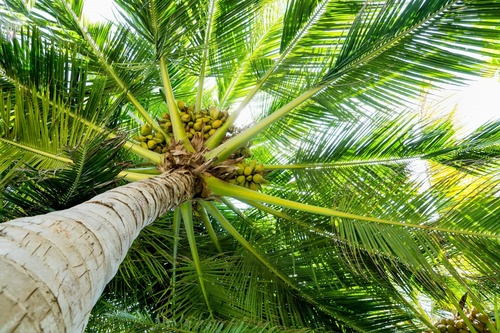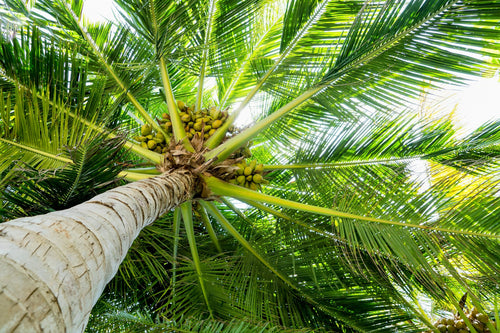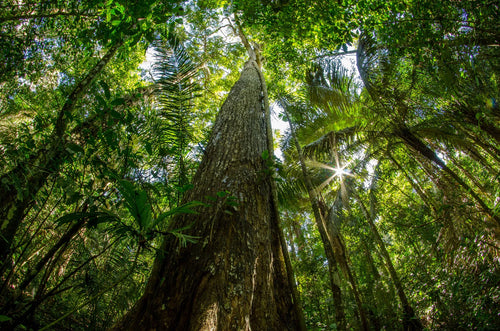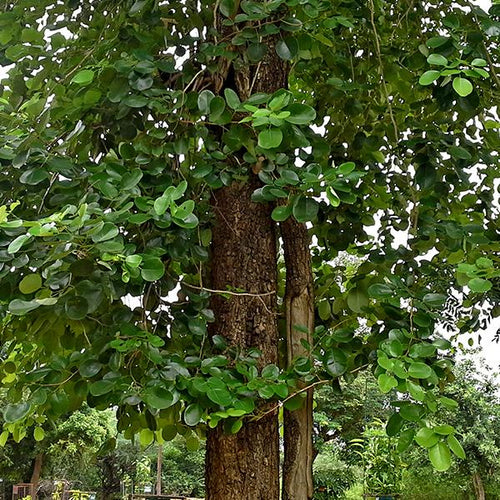Apollo Tyres’ Mission to Boost Farmer Livelihoods and Tree cover in Andhra Pradesh
Apollo Tyres Ltd. is a leading tyre manufacturer, renowned for innovation, quality, and a strong global presence. Established in 1972, the company ope Read more
Plantation Site Gallery
Project Update 4











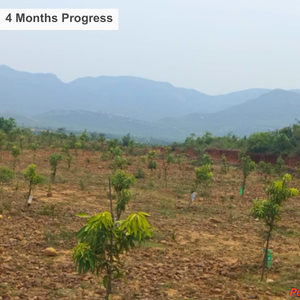
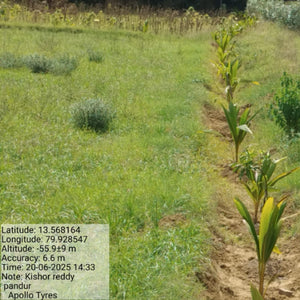





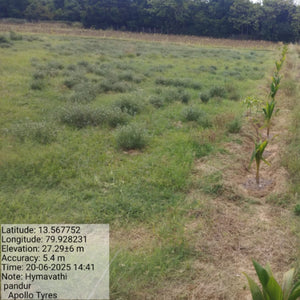
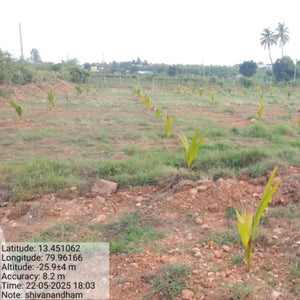












Project Update 3



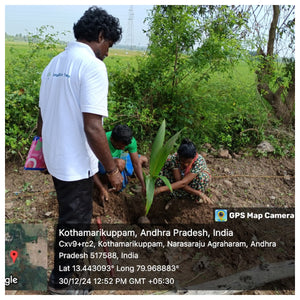
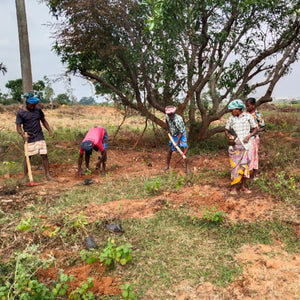

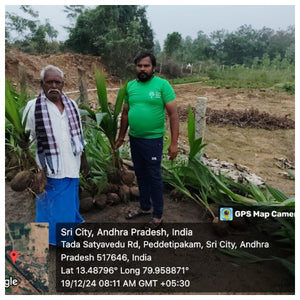

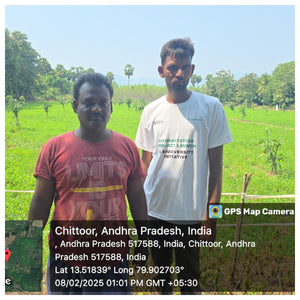
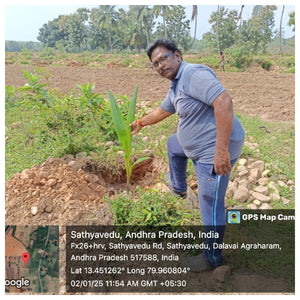
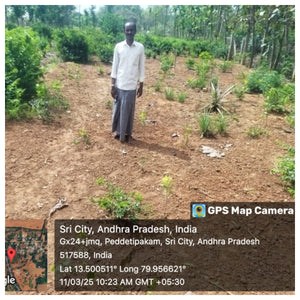
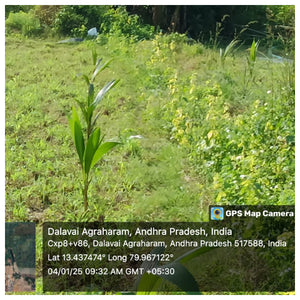
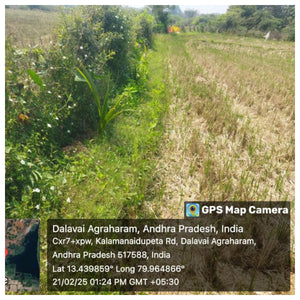
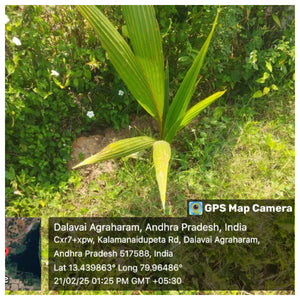
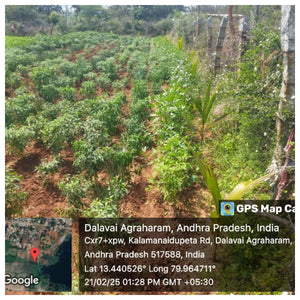

Project Update 2





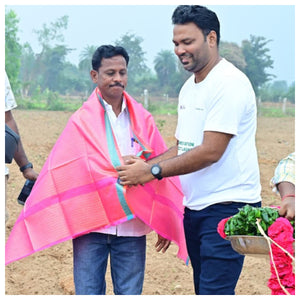
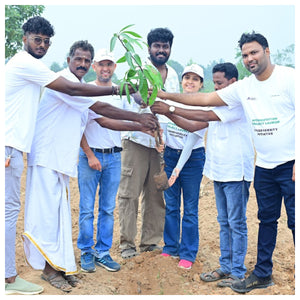

Project Update 1


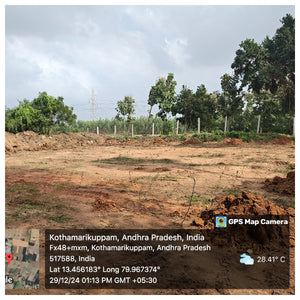


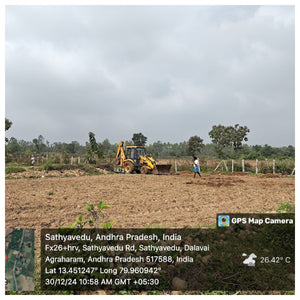
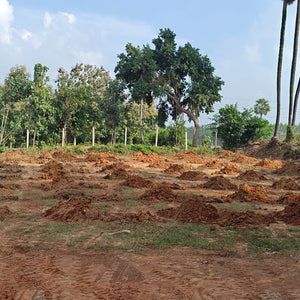
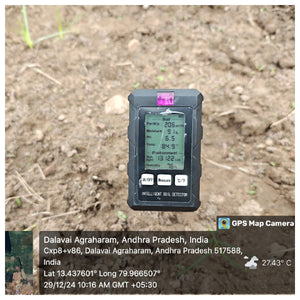
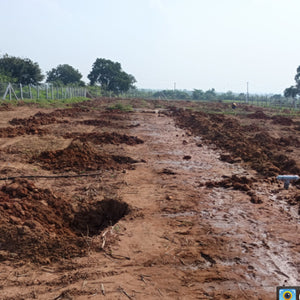
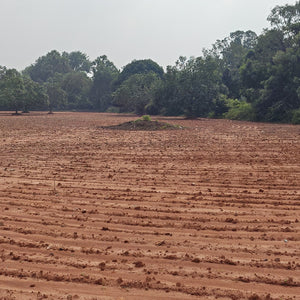
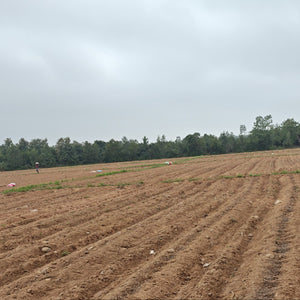
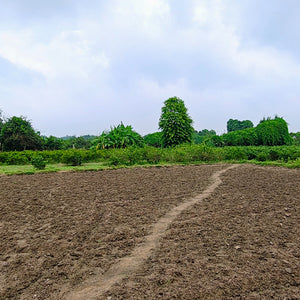
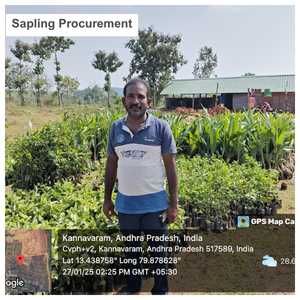
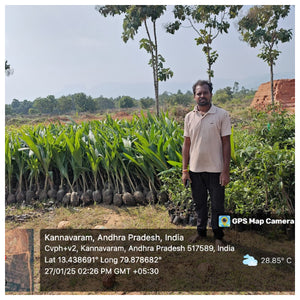
Digital Forest
Forest with 25,000 Trees planned
Want to plant your tree now?
Plant a Tree @ 299Apollo Tyres’ Mission to Boost Farmer Livelihoods and Tree cover in Andhra Pradesh
Apollo Tyres Ltd. is a leading tyre manufacturer, renowned for innovation, quality, and a strong global presence. Established in 1972, the company operates seven manufacturing units across India, the Netherlands, and Hungary, catering to diverse automotive needs. With a distribution network spanning over 100 countries, Apollo Tyres ensures high-performance mobility solutions. Committed to sustainability, the company actively promotes agroforestry and large-scale tree plantation drives to enhance biodiversity, soil health, and farmer livelihoods, reinforcing its vision for a greener future.
This initiative builds upon Apollo Tyres’ prior afforestation efforts in Tamil Nadu, where 3.5 lakh trees were planted, positively impacting 323 farmers’ families. By promoting income diversification, soil health improvement, water conservation, and carbon sequestration, the project strengthens farmers’ resilience against environmental and economic uncertainties.
Through this agroforestry model, Apollo Tyres is not only contributing to climate change mitigation but also empowering rural communities by offering them new income opportunities and ensuring long-term economic stability. This collaboration with Grow Billion Trees underscores the potential of public-private partnerships in driving large-scale reforestation and sustainability efforts, reinforcing Apollo Tyres' leadership in sustainable business practices.
This project not only reinforces Apollo Tyres' leadership in corporate environmental responsibility but also highlights its dedication to fostering a greener, more sustainable future for generations to come.
Project Planning & Execution
No of Trees: 25000 Trees
Plantation Location: Sri City, Tirupati District, Andhra Pradesh, 517646
Plantation Duration: 18th December 2024 to 14th February 2025
Name of Species: Coconut, Mango(Rukmani), Mango(Banganampalle), Guava, Sapota, Lemon, Teak, Mahogany, Red Sandalwood and White Sandalwood.
Species Selection & Its Benefits
The project prioritizes selecting tree species that are native to the region and well-suited to the local climate, ensuring better survival rates and contributing to the long-term ecological health of the area. In addition to the environmental benefits, the chosen species are aligned with local market demand, ensuring that they offer viable income opportunities for farmers.
The selected species—Coconut, Mango, Guava, Sapota, Lemon, Teak, Mahogany, and Chandan (Sandalwood)—represent a balanced combination of fruit-bearing and high-value timber trees suitable for tropical and semi-tropical regions of India. Fruit crops like Coconut, Mango, Guava, Sapota, and Lemon provide regular and seasonal income, nutritional benefits, and strong market demand, while also improving soil fertility and supporting biodiversity. Coconut is climate-resilient and multipurpose, Mango offers high commercial value, Guava provides early and quick returns, Sapota ensures consistent yields, and Lemon supports year-round harvesting potential. Timber species such as Teak and Mahogany contribute to long-term asset creation, carbon sequestration, and ecological stability due to their durable hardwood value. Chandan (Sandalwood), being a premium aromatic and medicinal species, adds significant economic potential over time. Together, this diversified species selection enhances environmental sustainability, strengthens farmer income security, improves green cover, and supports long-term ecological and financial benefits.
Overall, these species align well with agroforestry goals, fostering both ecological resilience and community well-being. This approach fosters a harmonious relationship between the environment and the community, ensuring that farmers can generate consistent income while contributing to the restoration of the local ecosystem.
Beneficiaries Details
This agroforestry initiative involves 54 farmers collectively planting 10 carefully selected sapling species integrated into existing farmland. The project aims to enhance farm productivity, strengthen livelihoods, and promote long-term ecological resilience.
For details on each farmer and their land's geolocation,
Planting Methodology and Its Advantages
Agroforestry: Apollo Tyres, in collaboration with Grow Billion Trees, has launched a transformative agroforestry initiative in Sri City, Andhra Pradesh, 517646, to promote environmental sustainability while enhancing farmers' livelihoods. As part of this initiative, 25,000 fruit-bearing, medicinal, and timber trees of 10 different species have been planted across 100.42 acres of farmland in Tirupati district, benefiting 54 farmers’ families. The project integrates tree plantation with existing agricultural practices, ensuring long-term ecological and economic growth.
Advantages of Agroforestry
-
Increased Farmer Incomes: This approach helps increase farmers' income by as much as 3 times. Farmers benefit from diversified income sources, lifting economic resilience.
-
Sustainable Livelihoods: Farmers benefit from diversified income sources through the sale of fruits and other tree-based products, reducing dependence on a single crop.
-
Enhanced Biodiversity: Agroforestry creates a diverse ecosystem by integrating trees with crops, attracting pollinators, birds, and beneficial insects that support natural pest control.
-
Environmental Sustainability: This model reduces carbon emissions and promotes sustainable land management, aligning with SDG 13 (Climate Action) and SDG 15 (Life on Land).
-
Food Security & Nutritional Benefits: Fruit-bearing trees provide a direct source of food, improving local nutrition while supporting long-term agricultural productivity.
-
Carbon Sequestration & Climate Resilience: Trees absorb carbon dioxide, helping mitigate climate change while providing shade and windbreaks that reduce temperature extremes and improve microclimatic conditions.
-
Soil Health and Water Conservation: Tree roots prevent soil erosion, enhance water retention, and improve soil fertility by fixing nitrogen and adding organic matter. Agroforestry systems also support groundwater recharge, reduce runoff, and improve soil moisture retention, making them ideal for drought-prone regions.
Activities During Tree Plantation
A day before the plantation event, the ground team carried out extensive site preparations, including digging pits to enhance water retention and soil conservation. This initiative built upon the 11,000 trees already planted in Phase 1, laying a strong foundation for large-scale reforestation. On the plantation day, representatives from Apollo Tyres, Grow Billion Trees (GBT), and the local Panchayat gathered to mark the next phase of the project. The event commenced with a warm welcome, followed by an introduction to the agroforestry initiative and its significance in promoting sustainable farming. Ms. Nidhi Singh and Mr. Satender Kumar from GBT addressed the audience, highlighting the economic and ecological advantages of integrating tree plantation with agriculture.
Following the felicitation ceremony, participants enthusiastically planted 196 trees, demonstrating their collective commitment to environmental sustainability. Farmers actively took part in the drive, recognizing the long-term benefits of agroforestry in improving soil health, reducing farming costs, and diversifying income sources. The plantation included a mix of fruit-bearing, medicinal, and timber trees, ensuring both economic and ecological impact. As the event concluded, attendees engaged in discussions on post-plantation care, community involvement, and future expansion plans. Refreshments were served, fostering a sense of camaraderie among all stakeholders. This successful event marked another significant step in Apollo Tyres' mission to empower rural communities through sustainable agroforestry practices.
Conclusion Elements
Direct Impact
| Parameters | Values | References |
| No. of Trees Planted | 25,000 | |
| Green Cover (Acres) | 100.42 acres | |
| Carbon Sequestration Potential (KG) | 20 |
Small to medium-sized trees can sequester around 10–48 kilograms (22–106 pounds) of CO₂ annually. https://onetreeplanted.org/blogs/stories/how-much-co2-does-tree-absorb |
| Carbon Sequestration by 25000 mature trees ( Tons/year) | 500 Tons | No. of Trees x Carbon Sequestration by 1 mature trees per year |
| Carbon Credit Equivalent | 500 | One carbon credit is equivalent to one tonne of carbon dioxide or the equivalent amount of another greenhouse gas. |
| Carbon Footprint of an avg Indian Citizen (Tons/Year) | 1.8 | https://www.iea.org/countries/india/emissions |
| Offsets Annual Carbon Footprint of (Adults) | 278 | Carbon offset by 25000 mature trees per year / Carbon Footprint of an avg Indian Citizen per year |
(This impact analysis is forward-looking (An Agroforestry project matures in 3-5 years)
Annual Production and Income Estimates of 25000 Trees Planted
| Category | No. of Trees | Production | Total Income | Establishment Period | Income Realisation Pattern |
| Fruit | 18,434 | 352.609 Tons | ₹15,546,006 | 1-5 Years | Recurring (Annual / Multiple harvests per year) |
| Timber | 4,420 | 163690 Cubic feet | ₹116,625,000 | 15-25 Years | One-time (at maturity / final harvest) |
| Heartwood | 2,227 | 82625 Cubic Feet | ₹275,193,750 | 15-25 Years | One-time (at maturity / final harvest) |
* Revenue/ Income outcomes in agroforestry depend on tree survival, varities, density, management quality, climate conditions, and market prices; figures shown are indicative planning estimates, not assured returns.
Detailed Assumptions for Production and Income Estimates
| Fruit Trees | |||||||
| Plant Name | Fruit Selling Price (per Kg) | Annual Production per Tree (Kg) | No. of Trees Planted | Total Production per year (Tons) | Total Revenue per year | COG's + weather/pests losses | Total Income |
| Mango (Rukmani) | ₹50 | 35 | 4,817 | 168.595 | ₹8,429,750 | 40% | ₹5,057,850 |
| Mango (Banganampalle) | ₹50 | 40 | 631 | ||||
| Guava | ₹9 | 30 | 2,298 | 68.94 | ₹620,460 | 40% | ₹372,276 |
| Sappota | ₹20 | 35 | 482 | 16.87 | ₹337,400 | 40% | ₹202,440 |
| Lemon | ₹1,000 | 2 | 4,222 | 8.444 | ₹8,444,000 | 40% | ₹5,066,400 |
| Coconut | ₹90 | 15 | 5,984 | 89.76 | ₹8,078,400 | 40% | ₹4,847,040 |
| Total | 18,434 | 352.609 | ₹25,910,010 | ₹15,546,006 | |||
| Timber Trees | |||||||
| Plant Name | Timber Selling Price( per Cubic Feet) |
Timber Production / Tree (Cubic feet) |
No. of Trees Planted | Total Production from 1 Harvest (Cubic feet) | Total Revenue from 1 Harvest | COG's + weather/pests losses | Total Income |
| Teak | ₹5,000 | 17 | 570 | 9,690 | ₹48,450,000 | 50% | ₹24,225,000 |
| Mahogany | ₹1,200 | 40 | 3,850 | 154,000 | ₹184,800,000 | 50% | ₹92,400,000 |
| Total | 4,420 | 163,690 | 233,250,000 | 116,625,000 | |||
| Heartwood Trees | |||||||
| Plant Name | Timber Selling Price( per Cubic Feet) |
Timber Production / Tree (Cubic feet) |
No. of Trees Planted | Total Production from 1 Harvest (Cubic feet) | Total Revenue from 1 Harvest | COG's + weather/pests losses | Total Income |
| Red Sandal | ₹12,000 | 60 | 770 | 46,200 | ₹554,400,000 | 75% | ₹138,600,000 |
| White Sandal | ₹15,000 | 25 | 1,457 | 36,425 | ₹546,375,000 | 75% | ₹136,593,750 |
| Total | 2,227 | 82,625 | 1,100,775,000 | 275,193,750 | |||
Indirect Impact
Community Impact
-
Empowerment of Farmers - By providing training and resources for sustainable farming practices, agroforestry equips farmers with skills to enhance productivity and adapt to environmental changes.
-
Food Security – By integrating fruit-bearing trees into agricultural systems, the initiative ensures a stable food supply, providing nutritious produce for both consumption and market sale.
-
Environmental Awareness – The project educates the local community on the importance of tree planting, biodiversity conservation, and sustainable land use.
-
Enhanced Social Equity – Agroforestry initiatives foster enhanced social equity by empowering marginalised farmers with sustainable livelihoods, bridging economic gaps, and promoting inclusive community participation in environmental conservation efforts.
-
Resilience to Climate Change – Agroforestry improves soil health, enhances water retention, and reduces land degradation, making farming communities more adaptable to changing climate conditions.
-
Health and Well-being – Increased green cover improves air quality, reduces heat stress, and provides access to nutrient-rich fruits, contributing to the overall health of local communities.
Environmental Impact
-
Carbon Sequestration: Trees act as carbon sinks, absorbing significant amounts of CO2 from the atmosphere, helping to mitigate climate change and reduce greenhouse gas emissions.
-
Soil Health Improvement: Agroforestry enriches soil through organic matter from fallen leaves and roots, improving fertility, structure, and nutrient availability for crops.
-
Erosion Prevention: Tree roots stabilise the soil, reducing erosion caused by wind and water while protecting nearby agricultural fields and water bodies.
-
Biodiversity Conservation: By creating habitats for various species, agroforestry enhances biodiversity, supporting pollinators, beneficial insects, and native wildlife.
-
Water Cycle Regulation: Trees improve water retention, recharge groundwater levels, and reduce surface runoff, contributing to a more balanced and sustainable water cycle.
-
Microclimate Regulation: Agroforestry moderates temperature extremes, reduces wind speeds, and increases humidity, creating favourable conditions for crop growth and ecosystem balance.
Achievements
SDG Goals Achieved through Agroforestry
-
SDG 1: No Poverty – By integrating agroforestry with traditional farming, the Apollo Tyres initiative provides farmers with additional income sources through fruit yields, improving economic resilience, and reducing poverty in rural areas.
-
SDG 2: Zero Hunger – The plantation of fruit-bearing trees enhances food security by offering nutritional produce while improving soil health for sustainable agricultural productivity.
-
SDG 3: Good Health and Well-Being – Tree plantations improve air quality, soil fertility, and water conservation, creating a healthier environment for local communities. The presence of green spaces also promotes mental well-being.
-
SDG 4: Quality Education – Apollo Tyres agroforestry initiative includes farmer training on sustainable land-use practices. These educational efforts equip farmers with knowledge on conservation, resource management, and climate-resilient agriculture.
-
SDG 6: Clean Water and Sanitation – By reducing soil erosion, improving groundwater recharge, and minimising surface runoff, the plantation promotes sustainable water management in the region.
-
SDG 8: Decent Work and Economic Growth – The initiative generates employment opportunities for rural communities, provides training in sustainable agroforestry, and supports long-term economic growth through enhanced land productivity.
-
SDG 9: Industry, Innovation, and Infrastructure – Apollo Tyres project integrates innovative agroforestry techniques, including multi-layer cropping systems and soil conservation methods, fostering sustainable land use and industry-community collaboration.
-
SDG 10: Reduced Inequalities – By involving small-scale and marginalised farmers, the project promotes economic inclusivity and reduces inequalities by ensuring equitable access to agroforestry benefits.
-
SDG 12: Responsible Consumption and Production – Agroforestry reduces dependency on chemical inputs, promotes organic farming, and ensures the responsible use of natural resources, supporting sustainable agricultural practices.
-
SDG 13: Climate Action – The trees planted by Apollo Tyres act as carbon sinks, sequestering atmospheric carbon dioxide, enhancing ecosystem resilience, and mitigating the effects of climate change in the region.
-
SDG 15: Life on Land – The Apollo Tyres initiative promotes biodiversity conservation, prevents deforestation, and restores degraded land, fostering healthy ecosystems and sustainable forestry practices.
-
SDG 17: Partnerships for the Goals – The collaboration between Apollo Tyres, Grow Billion Trees, and local farmers demonstrates the power of partnerships in achieving sustainability goals and fostering large-scale ecological restoration.
ESG Achieved through Agroforestry:
-
Environmental Impact: Apollo Tyres' agroforestry initiative plays a crucial role in environmental sustainability by enhancing carbon sequestration, restoring biodiversity, and improving soil and water conservation. The plantation of native and fruit-bearing trees supports climate change mitigation by reducing greenhouse gas emissions and increasing ecosystem resilience. Additionally, the project helps prevent soil erosion, improves groundwater retention, and contributes to a healthier, greener landscape. By integrating sustainable agroforestry practices, this initiative ensures long-term ecological benefits, fostering a self-sustaining environment that supports both nature and local communities.
-
Social Impact: The initiative brings significant social benefits by fostering sustainable livelihoods, improving food security, and enhancing community well-being. By integrating fruit-bearing trees, the project helps farmers diversify their income sources, ensuring greater economic stability and resilience for rural households. Agroforestry practices optimise land use efficiency, leading to higher agricultural productivity while maintaining ecological balance. The plantation also contributes to better air quality, creates green spaces for community well-being, and encourages local participation through awareness programmes. By engaging and educating stakeholders, the initiative empowers communities with the knowledge and skills to adopt sustainable land management practices, fostering long-term environmental and social sustainability.
-
Governance Impact: Apollo Tyres upholds strong governance principles by committing to ethical and responsible corporate practices in sustainability. The agroforestry initiative aligns with Apollo Tyres' with purpose and impact by creating a living, breathing gift for Mother Earth, ensuring transparency, accountability, and long-term impact. By collaborating with Grow Billion Trees, farmers, and local communities, Apollo Tyres fosters strategic partnerships that promote environmental stewardship and responsible land management. This initiative reflects Apollo Tyres' deep-rooted dedication to integrating ESG (Environmental, Social, and Governance) principles into its personal and broader value framework. It showcases a powerful example of leadership in sustainability and social responsibility, where environmental action is guided by spiritual intention and a profound sense of purpose.
Building Communities
Apollo Tyres' agroforestry initiative goes beyond tree plantation; it strengthens rural communities by empowering farmers, fostering collaborations, and creating sustainable livelihoods. By integrating environmental stewardship with social impact, the project nurtures a sense of shared responsibility, driving long-term benefits for both people and the planet.
-
Empowering Farmers: Apollo Tyres' agroforestry initiative strengthens farmers’ economic stability by diversifying income sources and improving agricultural productivity. By integrating tree plantations with existing farmland, farmers benefit from enhanced soil fertility, better crop yields, and long-term financial gains. This initiative promotes self-sufficiency and long-term environmental stewardship, ensuring a sustainable future for both farmers and the ecosystem.
-
Fostering Partnerships: Collaboration is at the core of Apollo Tyres' plantation initiative, bringing together corporate, environmental, and community stakeholders. The partnership between Apollo Tyres, Grow Billion Trees, and local farmers created a strong foundation for sustainable development. By leveraging collective expertise and resources, this initiative ensures that environmental and social benefits extend beyond the immediate plantation, fostering long-term ecological and economic resilience.
-
Creating a Ripple Effect: The impact of this initiative goes beyond tree planting; it sets in motion a chain reaction of positive environmental and social change. By improving biodiversity, enhancing carbon sequestration, and promoting sustainable farming, the project contributes to a healthier ecosystem. Additionally, as more farmers adopt agroforestry practices, the region experiences long-term economic and environmental benefits, inspiring further community-driven conservation efforts.
This initiative proved that environmental sustainability thrives when rooted in community effort. It’s not just about planting trees; it’s about planting hope, collaboration, and a shared vision for a greener tomorrow.
Commitment by Grow Billion Trees
-
Ensuring Tree Survivability: GBT prioritises native species, continuous monitoring, and soil health improvement using organic fertilisers. These efforts ensure sustainable growth and benefit the farmers and communities.
-
Transparency & Accountability: GBT provides detailed reports on tree growth, survival rates, and carbon benefits, using geo-fencing and regular updates to maintain transparency and effectiveness.
-
Sustainable Plantation Efforts: GBT implements projects that balance environmental, social, and economic goals, addressing urban heat islands and degraded farmlands. These efforts promote ecological balance, livelihoods, and long-term climate resilience.
-
Enhancing Ecosystem Health: By selecting native species and creating diverse habitats, GBT enhances biodiversity and ecosystem resilience, ensuring long-term ecological health and supporting wildlife.
-
Long-Term Impact: GBT’s initiatives tackle environmental challenges, enhance rural livelihoods, foster climate resilience, and promote sustainable development while reducing carbon footprints.
Acknowledgment
We extend our heartfelt gratitude for the successful completion of the plantation initiative at Sricity - Tada, Andhra Pradesh. This achievement represents a significant step towards environmental restoration, sustainable land use, and community empowerment. It would not have been possible without the collective efforts of dedicated individuals, local farmers, and partner organisations. Their unwavering commitment has played a crucial role in fostering a greener, more resilient ecosystem for future generations.
To Apollo Tyres: We sincerely thank Apollo Tyres for its unwavering dedication to sustainability and environmental conservation. By integrating agroforestry into its heartfelt initiative, Apollo Tyres has demonstrated a profound commitment to nurturing greener landscapes and uplifting local communities. Their vision blends ecological responsibility with environmental harmony, creating a lasting impact that supports both the environment and those who depend on it. We deeply appreciate Apollo Tyres' initiative in planting 25000 trees of native species. This effort will enhance biodiversity, improve soil health, and contribute to carbon sequestration, ensuring long-term ecological and economic benefits. Moreover, by promoting sustainable land use, this initiative plays a vital role in supporting farmers, providing them with an additional source of income through fruit production. Apollo Tyres' dedication to environmental sustainability and community upliftment is truly commendable, and we are grateful for their contribution to a greener and more resilient future.
To the Farmers of Sricity-Tada: Your dedication to embracing agroforestry and incorporating fruit-bearing trees into your farming practices is truly commendable. This initiative not only enriches soil health but also strengthens long-term agricultural sustainability. Your commitment to fostering a healthier ecosystem while securing a better future for future generations is inspiring. We are grateful to be part of this journey and look forward to witnessing the lasting positive impact of your efforts.
To Our Ground Partners and Volunteers: Your dedication, expertise, and passion for environmental conservation have been essential in making this initiative a success. Through our collective efforts, we have shown that collaboration and a shared vision for sustainability can create a lasting impact. Your invaluable contributions have played a crucial role in driving this mission forward, and we deeply appreciate your commitment. Thank you for being an integral part of this journey toward a greener future.
Through this collective effort, we have taken significant steps toward revitalising ecosystems, promoting sustainable agriculture, and enhancing the livelihoods of farmers in Sricity - Tada. This is just the beginning, and we look forward to strengthening our partnership in pursuit of a greener, more sustainable future for all.
Thank you for your unwavering commitment and support.
Closing Remarks
Apollo Tyres’ agroforestry initiative in Andhra Pradesh, with the plantation of over 25,000 trees, stands as a testament to its dedication to environmental sustainability and community empowerment. This initiative goes beyond afforestation it strengthens biodiversity, enriches soil health, and enhances the livelihoods of 54 farming families.
By incorporating a diverse range of 10 tree species, including Coconut, Mango (Rumani and Banganapalle), Guava, Sapota, Lemon, Teak, Mahogany, Sandalwood, and Red Sanders, the project ensures ecological balance and economic benefits. The integration of mixed cropping practices allows farmers to cultivate intercrops alongside fruit-bearing and timber trees, optimising land use and providing steady income sources throughout the year.
This initiative is not just a milestone but a foundation for long-term environmental stewardship and agricultural resilience. Through sustainable agroforestry practices and active farmer participation, the project ensures lasting ecological and economic benefits. Each tree planted represents a step towards a greener future, reinforcing Apollo Tyres’ commitment to climate action, biodiversity conservation, and rural prosperity.
We extend our sincere appreciation to all stakeholders who contributed to this initiative. As these trees grow, so will the positive impact on the environment and the community, creating a legacy of sustainability for future generations.
Appendix
Farmer list
Trees for Corporates
Trending
Most Popular
1. Apollo Tyres Agroforestry Projects
Apollo Tyres’ commitment to sustainability shines through its agroforestry initiatives, where trees are planted alongside agricultural crops to enhance environmental health. These projects aim to reduce carbon footprints, prevent soil erosion, and promote biodiversity, while improving the economic stability of farmers. Apollo Tyres has been at the forefront of integrating agroforestry into its environmental strategies, creating a blueprint for future corporate sustainability practices. It’s not just about planting trees; it’s about planting for the future—one that fosters environmental and economic resilience. So, next time you think of Apollo Tyres, picture them not only on roads but also growing green, empowering farmers, and saving the planet one tree at a time!
2. Sustainable Agriculture with Apollo Tyres
Sustainable agriculture is the key to both feeding the world and preserving it. Apollo Tyres’ tree plantation initiatives in agroforestry are an excellent example of how businesses can contribute to a healthier planet. By combining tree planting with agricultural practices, the initiative improves soil quality, conserves water, and enhances crop yield. This not only ensures long-term food security but also increases farmers' income by diversifying their sources of income through tree products. It’s a win-win for farmers, the environment, and the economy! Apollo Tyres is showing how the road to sustainability can be paved with trees.
3. Tree Planting for Carbon Offset
When it comes to battling climate change, every tree counts. Apollo Tyres’ tree planting efforts in agroforestry focus on enhancing the natural ability to absorb carbon dioxide and reduce greenhouse gas emissions. By planting trees alongside crops, the company is contributing significantly to carbon offsetting, which helps mitigate the impacts of global warming. The more trees planted, the greater the carbon sequestration, so this initiative is like a turbo boost for Mother Earth. It’s time we take a leaf out of Apollo Tyres’ book and start planting to protect our planet for future generations!
4. Farmer-Centric Sustainability
Farmers are at the heart of Apollo Tyres’ agroforestry initiatives, with each project carefully designed to benefit them directly. By integrating tree planting with existing farming practices, Apollo Tyres helps farmers diversify their income and become more resilient to climate change. Imagine a farmer in Andhra Pradesh not only growing crops but also harvesting timber, fruits, and medicinal plants from their trees. That’s the kind of farmer-centric sustainability Apollo Tyres champions. It’s about making farming smarter, not harder, and empowering farmers to thrive in an eco-friendly, economically stable world.
5. Agroforestry and Biodiversity
Agroforestry isn’t just about trees and crops; it’s about creating a rich ecosystem where biodiversity can thrive. Apollo Tyres’ agroforestry initiatives contribute significantly to this by increasing plant variety, attracting wildlife, and providing habitats for birds and insects. The integration of trees with farming practices ensures that ecosystems are restored, making the land more productive and sustainable. Through these efforts, Apollo Tyres helps preserve local biodiversity while benefiting the environment and farmers alike. So, while we can’t all be tree-huggers, supporting agroforestry is definitely a step in the right direction for a greener future!
6. Reducing Soil Erosion through Agroforestry
Soil erosion is a major threat to agriculture, but it’s one Apollo Tyres is tackling head-on through its agroforestry initiatives. By planting trees alongside crops, the roots help stabilize the soil, preventing it from washing away during heavy rainfall. This is especially crucial in areas prone to erosion, such as Andhra Pradesh and Tamil Nadu, where Apollo Tyres has made significant strides in promoting soil conservation. It’s like giving the earth a hug, ensuring that the ground stays intact while supporting agricultural growth. Less erosion means better crops, healthier soil, and a more sustainable future for farmers!
7. Climate Resilience with Agroforestry
In an era of unpredictable weather patterns and extreme climate events, building climate resilience is more important than ever. Apollo Tyres’ agroforestry initiative does just that by helping farmers adapt to climate change. The trees planted in these projects act as natural shields, reducing the impact of droughts and floods, improving water retention, and offering shade for crops. This makes farming more resilient to the changing climate, ensuring a stable livelihood for farmers. In a way, these trees are like superheroes—helping farmers face the challenges of a warming world and thrive despite the odds!
8. Sustainable Livelihoods for Farmers
Apollo Tyres’ agroforestry initiative offers farmers a unique opportunity to diversify their income and ensure long-term financial stability. By planting trees that produce fruits, timber, or medicinal plants, farmers gain an additional revenue stream that’s less susceptible to market fluctuations than traditional crops. This sustainability-focused approach not only boosts farmers' income but also helps them secure a stable livelihood for the long term. With Apollo Tyres paving the way for more sustainable agricultural practices, farmers are finding new opportunities to thrive, grow, and ensure a prosperous future for their families. It’s like a financial cushion made out of trees!
FAQ
What is the role of Apollo Tyres in promoting agroforestry in India?
Apollo Tyres plays a pivotal role in promoting agroforestry by integrating tree planting with traditional agricultural practices. This approach enhances environmental sustainability and provides economic benefits to farmers. Through its initiatives, Apollo Tyres has planted thousands of trees, creating new revenue streams for farmers and improving soil quality and biodiversity. By focusing on agroforestry, Apollo Tyres helps to combat climate change, enhance food security, and promote sustainable livelihoods for farmers across India.
How does Apollo Tyres' agroforestry initiative benefit farmers?
Apollo Tyres’ agroforestry initiative offers farmers multiple benefits, including enhanced income diversification and improved climate resilience. By planting trees alongside crops, farmers can earn additional income from timber, fruits, and other tree-based products. This model also helps reduce soil erosion, conserve water, and improve soil fertility, making farming more sustainable. Moreover, it protects farmers from the negative impacts of climate change, ensuring long-term economic stability and better crop yields.
What is agroforestry and why is it important for the environment?
Agroforestry is the practice of integrating trees into agricultural landscapes to improve biodiversity, enhance soil health, and provide additional income sources for farmers. This practice helps in soil conservation, water retention, and reducing greenhouse gas emissions. Trees in agroforestry systems also act as carbon sinks, mitigating the effects of climate change. By fostering sustainable land-use practices, agroforestry contributes to environmental restoration and ensures long-term productivity in farming communities.
How does tree planting help in carbon offsetting?
Tree planting is a natural and effective way to offset carbon emissions. Trees absorb carbon dioxide during photosynthesis, storing it in their biomass. Apollo Tyres’ tree plantation initiatives, especially in agroforestry, contribute to this process by increasing the overall tree cover. By planting trees in agricultural areas, the company helps reduce the carbon footprint, which aids in mitigating climate change. The trees also act as carbon sinks, absorbing CO2 and improving air quality, benefiting both the environment and local communities.
How does Apollo Tyres ensure transparency in its tree plantation initiatives?
Apollo Tyres ensures transparency in its tree plantation initiatives through a robust monitoring and reporting system. The company collaborates with local communities and partners like Grow Billion Trees to ensure proper implementation of the projects. Regular audits, data collection, and reporting help track the progress of plantation activities, ensuring that they meet their environmental and social goals. Transparency is maintained at every step, from selecting farmer participants to tracking tree growth, ensuring accountability and long-term impact.
What are the Sustainable Development Goals (SDGs) achieved by Apollo Tyres’ agroforestry projects?
Apollo Tyres’ agroforestry initiatives contribute to several SDGs, including combating climate change (SDG 13), promoting sustainable agriculture (SDG 2), and ensuring decent work and economic growth (SDG 8). The projects also help reduce poverty (SDG 1) by creating additional income sources for farmers, while fostering biodiversity and life on land (SDG 15). These initiatives are part of Apollo Tyres’ broader commitment to sustainable development, ensuring long-term positive impacts on both the environment and society.
What areas in India are benefiting from Apollo Tyres’ tree plantation initiatives?
Apollo Tyres’ tree plantation initiatives have benefitted regions in Tamil Nadu and Andhra Pradesh, particularly in areas like Tirupati district. The company focuses on rural and farming communities, where farmers are empowered through agroforestry practices. By planting trees in these areas, Apollo Tyres helps improve soil fertility, increase water retention, and create new income sources for farmers. These projects have become models for other states to adopt sustainable agricultural practices.
How does Apollo Tyres’ agroforestry initiative contribute to climate resilience?
Apollo Tyres’ agroforestry initiative contributes to climate resilience by enhancing farmers’ ability to cope with extreme weather conditions. Trees planted alongside crops protect against soil erosion, reduce the impact of droughts, and improve water retention. This system also acts as a buffer against floods by absorbing excess water, thus reducing crop damage. By integrating trees into farming systems, Apollo Tyres helps farmers become more resilient to changing climate patterns, ensuring food security and economic stability.
What types of trees are planted under Apollo Tyres’ agroforestry initiative?
Apollo Tyres’ agroforestry initiative involves planting a variety of tree species, depending on the local climate and the needs of the farmers. Common trees include fruit-bearing varieties, timber trees, and medicinal plants. These trees provide multiple benefits, such as increased income from timber and fruit, improved soil health, and enhanced biodiversity. By selecting suitable species for each region, Apollo Tyres ensures the long-term sustainability of its agroforestry projects and the livelihood of farmers involved.
How does Apollo Tyres’ tree plantation initiative align with its corporate social responsibility (CSR) goals?
Apollo Tyres’ tree plantation initiative is a core part of its CSR strategy, focusing on environmental sustainability, community empowerment, and climate action. Through agroforestry, the company not only contributes to carbon sequestration but also supports rural farmers by offering them a diversified source of income. This initiative reflects Apollo Tyres’ commitment to social good, improving livelihoods, and reducing environmental impact. By integrating sustainability into its business practices, Apollo Tyres is helping build a more sustainable future for both the environment and the communities it serves.
- Choosing a selection results in a full page refresh.
- Opens in a new window.



